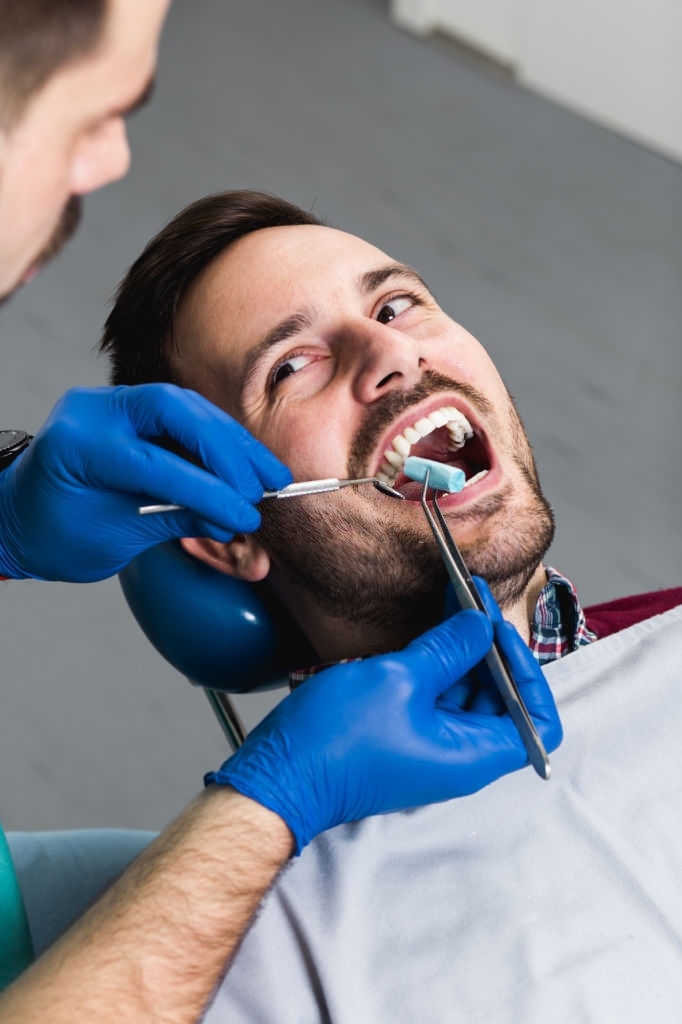Tooth Repair
Tooth Repair
Dentistry is a very fast moving industry. Below is an overview of some of the options what may be available to repair a diseased or damaged tooth.
Tooth Fillings
Fillings are used to repair a cavity in your tooth caused by decay. Most common tooth fillings used are:
- Composite fillings (tooth coloured)
- Amalgam (silver coloured)
- Glass ionomer (tooth coloured)
- Gold inlays and onlays (gold coloured)
- Porcelain inlays (tooth coloured)
- Ceramic/porcelain inlays and onlays (like gold)
What are composite fillings?
These are white coloured fillings essentially made of resin. After the tooth is prepared, the filling is bonded onto the area and a light shone onto it to set it. The dentist will choose a shade to match your own teeth, although over time staining can happen.


What are amalgam fillings?
Amalgam fillings are silver coloured. They are made by combining mercury and a silver alloy (50% mercury, 35% silver, and 15% tin, copper and other metals). Amalgam is long lasting and hard wearing and has been used in fillings for at least 150 years.
What are glass ionomer fillings?
Glass ionomer fillings form a chemical link with the tooth. They may also release fluoride, which helps to prevent further tooth decay. This type of filling is fairly weak.
What are gold inlays and onlays?
These can be used in most areas of the mouth. An inlay is small and placed within the biting surface of the tooth. An onlay can cover a larger area of the tooth. Gold is the most long-lasting and hard-wearing filling material and will last for many years. An advantage of gold is that it does not tarnish and has great strength.
What are porcelain inlays?
Your dental team can now use digital technology (called CADCAM) to design and prepare perfectly fitted porcelain inlays in just one or two visits. Porcelain inlays can also be made in a laboratory but this will need at least two visits to your dentist. Porcelain can be hard wearing and long lasting. It can also be coloured to match your natural tooth.
Crowns / Post Crowns
Crowns are an ideal way to repair teeth that have been broken, or have been weakened by decay or a very large filling. A crown could be used for a number of other reasons, for example:
- you may have a discoloured filling and would like to improve the appearance of the tooth
- you may have had a root filling and need a crown to protect what is left of the tooth
- it may help to hold a bridge or denture firmly in place.
Most common types of crowns are:
- *All-ceramic (Emax): this modern technique offers a metal-free alternative, which can give the strength of a bonded crown and the appearance of a porcelain crown. Therefore it is suitable for use in all areas of the mouth.
- *Zirconia: these crowns look natural and can be used anywhere in the mouth. They are very hard wearing and have very good longevity.
- Porcelain: these crowns are made entirely out of porcelain; they function well and has natural-like aesthetics
- Porcelain bonded to precious metal: this is what most crowns were made from in the past. A precious metal base is made and then porcelain is applied in layers over it.
- Gold-alloy crowns: gold is one of the oldest filling materials. Today it is used with other metal alloys to increase its strength, which makes it very hardwearing. These crowns are silver or gold in colour.
What is Emax (all ceramic) crown?
This is a type of all-ceramic crown with an appealing translucent colour which is combined with extra strength and durability.
This crown is made from a single block of lithium disilicate ceramic: this is a top grade material which has been harvested for its toughness, durability and opaque qualities which makes it a highly prized crown.
What are Zirconia crowns?
This type of crown is made from zirconia, a very strong material which is compatible with the human body. Zirconia is used in many other medical applications such as artificial joints and is known for its strength and durability.
Zirconia is a type of crystal which is long lasting and indestructible.
Plus there is no fear about the body rejecting zirconia or displaying an allergic reaction to it. It is safe to use and preferred by many people to porcelain fused to metal crowns.
What are porcelain crowns?
Full porcelain crowns are sometimes recommended by the dentist for restoration work of upper and/or lower front teeth. In aesthetic terms full porcelain crowns are superior to porcelain fused to metal/gold crowns because they are produced using full porcelain thus allowing for a more natural appearance.
What are porcelain fused to metal crowns?
Porcelain fused to metal crowns (or PFM/PBC crowns) can be referred to as full-cast crowns which has porcelain fused to a metal core that covers the entire or part of the tooth. Porcelain-fused-to-metal crowns are relatively aesthetic restorations that have been in use for more than 40 years. In one way, they combine the best of both worlds, the metal core gives the crown strength and the porcelain fused on top will give the crown reasonable aesthetics. In some situations where an underlying greyish/dark colour need to be hidden, they can be the best aesthetic option present.
What are gold crowns?
Gold crowns are made of cast gold, a technique that has been in existence for over a hundred years and is very successful. As aesthetics has become more of a factor, the use of gold is declining. Cast gold crowns have no match with regard to long-term service and minimal wear to opposing teeth, their greatest advantage. They are still a very good option in the case of back teeth where a patient’s requirements are function only and the tooth is not visible to be an aesthetic concern.
Dr Lachhanni is the perfect dentist for those who like me are nervous of going to the dentist. He explains the treatment in a very clear and concise way, taking his time and making sure you are pain free. I was handed the TV remote controls to choose my favourite programme whilst treatment was taking place. He gave me excellent advice on how best to look after and clean my teeth. The dental surgery is easy to find, clean and modern. I was also impressed that my initial contact was made via email to them on a Sunday - I received a phone call the same day with an emergency appointment booked for the following day - what an amazing service!
Yvonne Scott
Amazing experience and service at the Gerrards Cross Dentist. I’ve been seen by Dr J Bahra over the last few weeks and was made to feel extremely comfortable with quick and painless procedures. Will definitely be booking in my teeth whitening soon. Thanks!
Natasha Selina
What an amazing dental practice. My partner went here for some work when we recently moved to the area and he recommended the practice. I honestly thought ‘How good can a dentist really be?’ ... well I just discovered!
Not only was the treatment quick, effective and painless, but you also get to watch Netflix whilst it’s being done! Probably the most relaxing hour of my day.
I highly recommend!
Rowan Luckie
I recently moved to the area and chose to come to Gerrards Cross Dentist based on some reviews here. The reviews are accurate, it’s a very warm and welcoming place but most importantly the dentists are of the highest quality. Very caring with aftercare that has been second to none. I couldn’t recommend this dentist enough.
James
Previous
Next

Contact Us

Opening Hours
| Mon | 9:00AM to 6:00PM |
| Tues | 9:00AM to 6:00PM |
| Wed | 9:00AM to 6:00PM |
| Thur | 9:00AM to 6:00PM |
| Fri | 9:00AM to 6:00PM |
| Sat | 9:00AM to 2:00PM |
| Sun | 9:00AM to 2:00PM |



